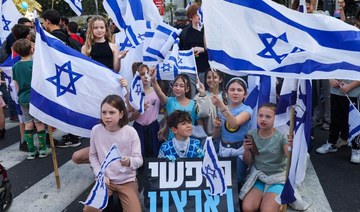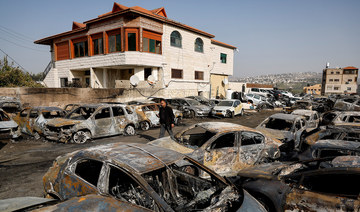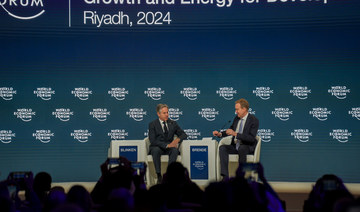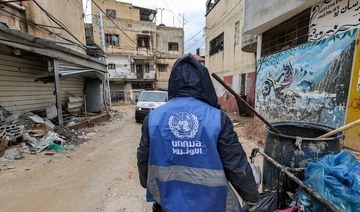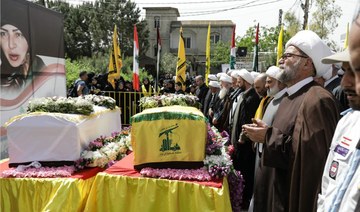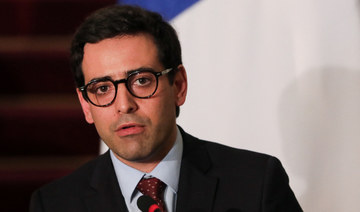TEL AVIV: Weeks of anti-government protests in Israel turned violent on Wednesday for the first time as police fired stun grenades and a water cannon at demonstrators who blocked a Tel Aviv highway. The crackdown came shortly after Israel’s hard-line national security minister urged a tough response to what he said were “anarchists.”
The violence came as thousands across the country launched a “national disruption day” against the government’s plan to overhaul Israel’s judicial system.
Prime Minister Benjamin Netanyahu’s allies say the program is meant to reduce the influence of unelected judges. But critics, including influential business leaders and former military figures, say Netanyahu is pushing the country toward authoritarian rule and has a clear conflict of interest in targeting judges as he stands trial on corruption charges.
Since Netanyahu’s government took office two months ago, tens of thousands of people have taken to the streets to protest the changes, which they say endangers Israel’s fragile system of checks and balances. Wednesday, however, marked the first time police used force against the crowds.
The government is barreling ahead with the legal changes and a parliamentary committee is moving forward on a bill that would weaken the Supreme Court.
The crisis has sent shock waves through Israel and presented Netanyahu with a serious challenge. A wave of Israeli-Palestinian violence in the occupied West Bank has compounded his troubles.
The rival sides are digging in, deepening one of Israel’s worst domestic crises. Netanyahu and his government, made up of ultranationalists, have branded the protesters anarchists, while stopping short of condemning a West Bank settler mob that torched a Palestinian town earlier this week.
The legal overhaul has sparked an unprecedented uproar, with weeks of mass protests, criticism from legal experts and rare demonstrations by army reservists who have pledged to disobey orders under what they say will be a dictatorship after the overhaul passes. Business leaders, the country’s booming tech sector and leading economists have warned of economic turmoil under the judicial changes. Israel’s international allies have expressed concern.
In the first scenes of unrest since the protests began two months ago, police arrived on horseback in the center of the seaside metropolis of Tel Aviv, hurled stun grenades and used a water cannon against thousands of protesters who chanted “democracy” and “police state.” A video posted on social media showed a police officer pinning down a protester with his knee on the man’s neck and another showed a man who reportedly had his ear ripped off by a stun grenade.
Facing the police, protesters also chanted “where were you,” a reference to the absence of security forces during the settler attack on the Palestinian town of Hawara, which took hours to quell and which the military said it was not prepared for.
Police said protesters threw rocks and water bottles at the officers. Police said they arrested 39 protesters in Tel Aviv for disturbing the peace while 11 people were hospitalized with various injuries, according to Tel Aviv Sourasky Medical Center. Earlier Wednesday, protesters blocked Tel Aviv’s main freeway and the highway connecting the city to Jerusalem, halting rush hour traffic for about an hour. At busy train stations in Tel Aviv, protesters prevented trains from departing by blocking their doors.
National Security Minister Itamar Ben-Gvir, an ultranationalist accused of politicizing the police, has vowed to take a tough line. He called on police to prevent the road blockages, labeling the demonstrators “anarchists.”
Netanyahu said Ben-Gvir had his full support. “We will not tolerate violence against police, blocking roads and blatant breaches of the country’s laws. The right to protest is not the right to anarchy,” he said.
Netanyahu also blamed opposition leader Yair Lapid for fomenting anarchy. Lapid called on police to show restraint and said Netanyahu’s government had lost control.
“The protesters are patriots,” Lapid tweeted. “They are fighting for the values of freedom, justice and democracy. The role of the police is to allow them to express their opinions and fight for the country they love.”
Thousands of protesters came out in locations across the country waving Israeli flags. Parents marched with their children, tech workers walked out of work to demonstrate and doctors in scrubs protested outside hospitals. The main rallies were expected later Wednesday outside the Knesset, or parliament, and near Netanyahu’s official residence in Jerusalem.
“Every person here is trying to keep Israel a democracy and if the current government will get its way, then we are afraid we will no longer be a democracy or a free country,” said Arianna Shapira, a protester in Tel Aviv. “As a woman, as a mother, I’m very scared for my family and for my friends.”
Justice Minister Yariv Levin, the overhaul’s main architect, said Tuesday that the coalition aims to ram through some of the judicial overhaul bills into law in the coming month, before the parliament goes on recess for the Passover holiday on April 2.
The Knesset also is set to cast a preliminary vote Wednesday on a separate proposal to protect Netanyahu from being removed from his post, a move that comes following calls to the country’s attorney general to declare him “unfit for office.”
Netanyahu has been the center of a years-long political crisis in Israel, with former allies turning on him and refusing to sit with him in government because of his corruption charges. That political turmoil, with five elections in four years, culminated in Netanyahu returning to power late last year, with ultranationalist and ultra-Orthodox parties as partners in the current far-right government.
Wielding immense political power, those allies secured top portfolios in Netanyahu’s government, among them Ben-Gvir, who before entering politics was arrested dozens of times and was once convicted of incitement to violence and support for a terror group. Finance Minister Bezalel Smotrich, a firebrand West Bank settler leader, has been given authority over parts of the territory.
They have promised to take a tough stance against Palestinians, which has ratcheted up tensions in recent weeks. Smotrich publicly called for a harsh response to the killing of two Israelis in the West Bank by a Palestinian gunman, saying Israel should “go crazy,” shortly before Sunday’s mob violence. While he later urged restraint, he also said Wednesday that Hawara, the Palestinian town that was attacked, should be “erased.”
In addition to the protests, Netanyahu’s government, Israel’s most right-wing ever, is beginning to show early cracks, just two months into its tenure.
The government says the legal changes are meant to correct an imbalance that has given the courts too much power and allowed them to meddle in the legislative process. They say the overhaul will streamline governance and say elections last year, which returned Netanyahu to power with a slim majority in parliament, gave them a mandate to make the changes.
Critics say the overhaul will upend Israel’s system of checks and balances, granting the prime minister and the government unrestrained power and push the country toward authoritarianism.
Israeli police crack down, clash with anti-Netanyahu protest
https://arab.news/2t8tj
Israeli police crack down, clash with anti-Netanyahu protest
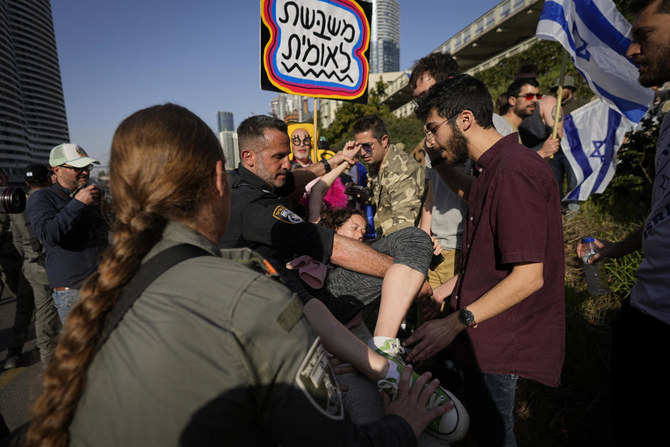
- Israel’s hard-line national security minister urged a tough response to what he said were “anarchists"
Israel concerned over possible ICC arrest warrants related to Gaza war
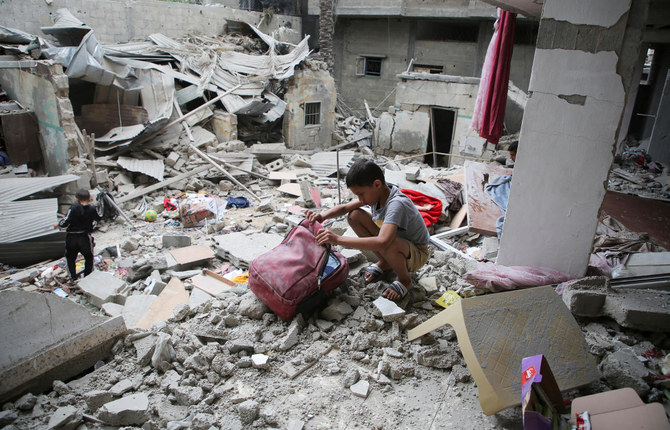
The ICC — which can charge individuals with war crimes, crimes against humanity and genocide — is investigating Hamas’ Oct. 7 cross-border attack and Israel’s devastating military assault on Hamas-ruled Gaza, now in its seventh month.
In response to Israeli media reports that the ICC might soon issue arrest warrants for senior Israeli government and military officials, Foreign Minister Israel Katz on Sunday warned Israeli embassies to bolster their security because of the risk of a “wave of severe antisemitism.”
“We expect the court (ICC) to refrain from issuing arrest warrants against senior Israeli political and security officials,” Katz said. “We will not bow our heads or be deterred and will continue to fight.”
Prime Minister Benjamin Netanyahu said on Friday that any ICC decisions would not affect Israel’s actions but would set a dangerous precedent.
Israeli officials are worried that the court could issue arrest warrants against Netanyahu and other top officials for alleged violations of international humanitarian law in Gaza, Israeli media have reported.
They said the ICC is also considering arrest warrants for leaders from Hamas.
The ICC, based in The Hague, and Hamas, Gaza’s ruling group, did not immediately respond to requests for comment.
Israel is not a member of the court and does not recognize its jurisdiction, but the Palestinian territories were admitted with the status of a member state in 2015.
In October, ICC Chief Prosecutor Karim Khan said the court had jurisdiction over any potential war crimes committed by Hamas fighters in Israel and by Israeli forces in the Gaza Strip.
Khan has said his team is actively investigating any crimes allegedly committed in Gaza and that those who are in breach of the law will be held accountable.
On Oct. 7, Hamas led an attack on Israeli military bases and communities in which 1,200 people were killed, mostly civilians, and 253 were taken as hostages, according to Israeli tallies.
Israel has since launched a ground, air and sea offensive that has killed more than 34,000 Palestinians, according to Gaza authorities, and has laid much of the small, densely populated coastal territory to waste.
The Gaza Health Ministry does not distinguish between combatants and non-combatants in its casualty reports but most of the fatalities have been civilians, health officials say.
Israel says that it takes precautions to minimize civilian deaths and that at least a third of the Gaza fatalities are combatants, figures that Hamas has dismissed.
Israel’s military campaign has displaced most of the blockaded Palestinian enclave’s 2.3 million people and created a humanitarian crisis.
The case at the ICC is separate from a genocide case launched against Israel at the International Court of Justice, also based in The Hague.
The ICJ, also known as the World Court, is a United Nations court that deals with disputes between states, while the ICC is a treaty-based criminal court focusing on individual criminal responsibility for war crimes.
Likely attack by Yemen’s Houthis targets a vessel in the Red Sea
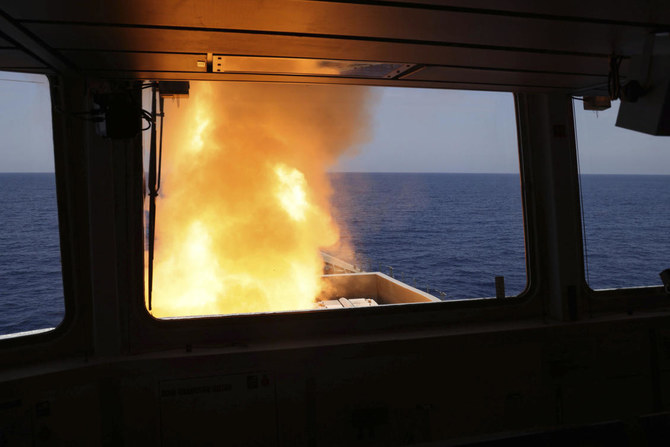
- The attack happened off the coast of Mokha, Yemen
- The Houthis did not immediately acknowledge any attacks
JERUSALEM: A suspected attack by Yemen’s Houthis targeted a vessel in the Red Sea on Monday, authorities said, the latest assault in their campaign against international shipping in the crucial maritime route.
The attack happened off the coast of Mokha, Yemen, the British military’s United Kingdom Maritime Trade Operations center said, without offering any other immediate details.
It urged vessels to exercise caution in the area.
The Houthis did not immediately acknowledge any attack there, though suspicion fell on the group. It typically takes the militia several hours before claiming their assaults.
The Houthis say their attacks on shipping in the Red Sea and Gulf of Aden are aimed at pressuring Israel to end its war against Hamas in Gaza, which has killed more than 34,000 Palestinians there. The war began after Hamas-led militants attacked Israel on Oct. 7, killing 1,200 people and taking some 250 others hostage.
The Houthis have launched more than 50 attacks on shipping, seized one vessel and sank another since November, according to the US Maritime Administration.
Houthi attacks have dropped in recent weeks as the militia has been targeted by a US-led airstrike campaign in Yemen. Shipping through the Red Sea and Gulf of Aden has declined because of the threat.
American officials have speculated that the militia may be running out of weapons as a result of the US-led campaign against them and after firing drones and missiles steadily in the last months. However, the Houthis have renewed their attacks in the last week.
The Houthis on Saturday claimed it shot down another of the US military’s MQ-9 Reaper drones, airing footage of parts that corresponded to known pieces of the unmanned aircraft. US Air Force Lt. Col. Bryon J. McGarry, a Defense Department spokesperson, acknowledged to The Associated Press on Saturday that “a US Air Force MQ-9 drone crashed in Yemen.” He said an investigation was underway, without elaborating.
Nations must find ways to unite on ‘issues that affect planet’: UAE adviser
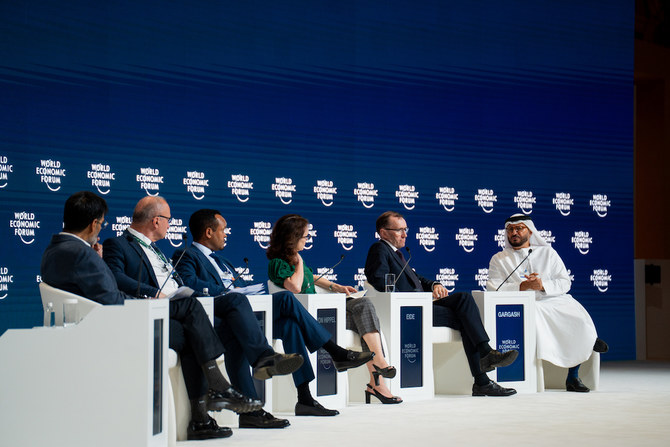
- Tech, climate are key, says Anwar Gargash at World Economic Forum
- Norway FM highlights credibility ‘crisis’ of global, Western institutions
RIYADH: Nations must look for ways to unite on issues that “affect the planet” for the prosperity and stability of the global community, a senior UAE official told a World Economic Forum session here on Monday.
“We have to find a way that non-geostrategic issues should bring us together, rather than take us apart. I think technology, climate should bring us together because we have a vested interest,” said Anwar Gargash, diplomatic adviser to the UAE president, during a panel discussion titled “Rising Powers for a Multipolar World.”
“We might all argue about who pays what, how fast it should go … but ultimately we should recognize that these issues that affect the planet are issues that we will all suffer from,” he added.
Gargash said that “to some certain extent we have a knack for politicizing these issues rather than making these issues an adhesive that brings us together.”
Another panelist, Croatia’s Foreign Affairs Minister Gordan Grlic Radman emphasized the importance of multilateral relationships, “not replacing them … and not watering down rules-based order. Rules are there to respect them.”
Espen Barth Eide, Norway’s foreign affairs minister, added that the global community was experiencing a crisis of credibility. This has been exacerbated by the situation in Gaza and by “the inability of many Western countries who have hesitated to use the same type of language … they used against Russia.”
“When it comes to Gaza, we have not been able to see the same type of response … the way that Israel has conducted the war has also been very problematic in light of global norms. If we do not call out that it comes back and haunt even the arguments on Ukraine,” Eide said.
“To be frank it is a crisis of Western-initiated values, but they also have turned into a crisis of institutions. The response to that is to be very clear on our own practice, as Norway, with friends. If we believe certain things are right or wrong, we should apply them consequentially across the board.”
Gargash said that building bridges and making friends has been the UAE’s strategy. “We see ourselves more on the geo-economic phase of our foreign policy. That in itself reflects what are our priorities with regards to BRICS or any other international organization we seek to join.
“We are increasing and concretizing the sort of bridges that we have. We are looking at it more on the geo-economic perspective. We have no interest in creating further schisms within the international system. We have an interest in being able to reach out on all our friends, and create more opportunities.
“Countries like us cannot afford to be fatalistic, and see this things are happening anyway. I think we need to work, whether in smaller or larger groups, it depends really on the situation … whether we will be more effective working with an Arab consensus, then we will do it.
“We are interested in joining many other organizations, we are looking at it from the perspective of having more friends, more bridges, more economic opportunities rather than a rejection of something and an adoption of something else.”
Citing the China-US relationship in the past, the UAE official said that “we should remember that this is not 1945, it is our duty as other countries to emphasize always that we are not at that moment and we do not want to recreate that bipolarity of the past.”
Gargash added: “The important thing is it is our job, whenever the China-US relationship is on the table, not to think in (a) 1945 framework but to say this is a different world. India today is not the India of 1945, Europe is not the Europe of 1945. There are many other players, we cannot ease the other players out and think of just the two major parties.”
Red Cross has no mandate to replace UNRWA in Gaza, chief says
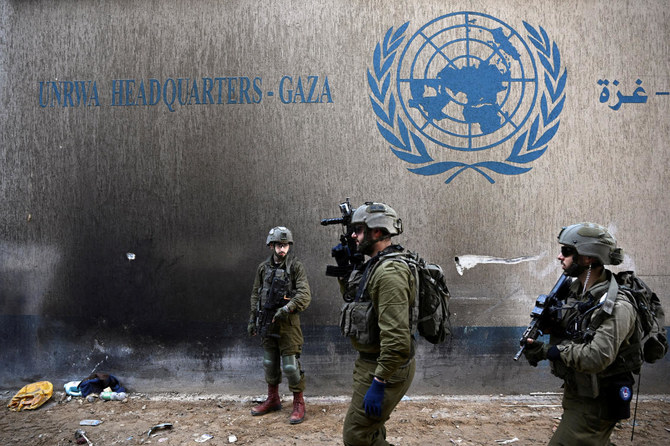
- Earlier report concluded that Israel had failed to furnish proof that some UNRWA employees had links to “terrorist organizations” such as Hamas
GENEVA: The International Committee of the Red Cross (ICRC) does not have a mandate to replace the United Nations agency for Palestinian refugees in Gaza, its director general said in comments published on Monday.
UNRWA was swept into controversy in January when Israel accused 12 of its 30,000 employees of being involved in the October 7 Hamas attacks which led to the deaths of around 1,160 people — mostly civilians — according to an AFP count based on official Israeli figures.
Israel’s retaliatory offensive has killed nearly 35,000 people in Gaza, mostly women and children, according to the health ministry in the Hamas-run Palestinian territory.
The UN immediately fired the implicated staff members and launched an internal investigation to assess the agency’s neutrality.
“We have completely different mandates,” ICRC director general Pierre Krahenbuhl told Swiss daily Le Temps in an interview.
UNWRA’s mandate “comes from the UN General Assembly, the ICRC’s from the Geneva Convention. The ICRC cannot take over UNRWA’s mandate,” he said.
“We already have enough to do without replacing other organizations,” said Krahenbuhl, who himself had headed UNRWA between 2014 and 2019.
Last week, a report by an independent group led by French former foreign minister Catherine Colonna concluded that Israel had failed to furnish proof that some UNRWA employees had links to “terrorist organizations” such as Hamas.
UNWRA is a crucial provider of food to Palestinian refugees, defined as Palestinians who fled or were expelled around the time of Israel’s 1948 creation, or their descendants.
In March, UNRWA head Philippe Lazzarini said UNRWA had “reached a breaking point,” with israel calling for its dismantling, major donors freezing their funding due to the Israeli accusations, and the people of Gaza facing a desperate humanitarian crisis.
Hamas claims rocket barrage from Lebanon into north Israel
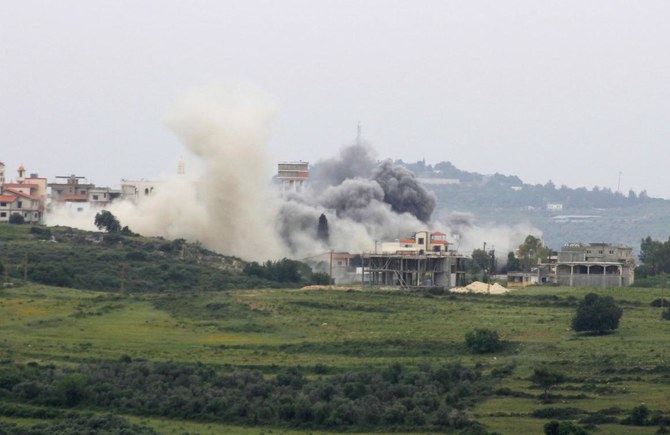
- No injuries or damages were reported
BEIRUT: Hamas’s armed wing said its militants in Lebanon’s south launched Monday a slew of rockets at a northern Israeli military position, as fighting has raged on in the Gaza Strip.
After Hamas’s October 7 attack on Israel triggered war in Gaza, its powerful Lebanese ally Hezbollah has exchanged near-daily fire with Israeli forces across the border.
Palestinian factions and other allied groups in Lebanon have also sometimes claimed attacks.
Hamas fighters “have fired a concentrated rocket barrage from south Lebanon toward” an Israeli military position, said the Ezzedine Al-Qassam Brigades in a statement on Telegram.
The armed wing described the action as a “response to the massacres of the Zionist enemy (Israel)” in Gaza and the occupied West Bank.
the Israeli army told AFP that “approximately 20 launches crossed from Lebanon into Israeli territory” but it had intercepted most rockets and struck “the sources of fire.”
“No injuries or damage were reported,” the army said.
The latest rocket barrage came as Hamas negotiators were expected to arrive in Egypt on Monday, where they were due to respond to Israel’s latest proposal for a long-sought truce in Gaza and hostage release.
On April 21, the Qassam Brigades claimed a rocket barrage into northern Israel.
A strike in January, which a US defense official said was carried out by Israel, killed Hamas deputy leader Saleh Al-Aruri and six other militants in Hezbollah’s south Beirut stronghold.
In Lebanon, at least 385 people have been killed in months of cross-border violence, mostly militants but also 73 civilians, according to an AFP tally.
The tally includes at least 11 Hamas fighters.
Israel says 11 soldiers and nine civilians have been killed on its side of the border.
Tens of thousands of people have been displaced on both sides.



